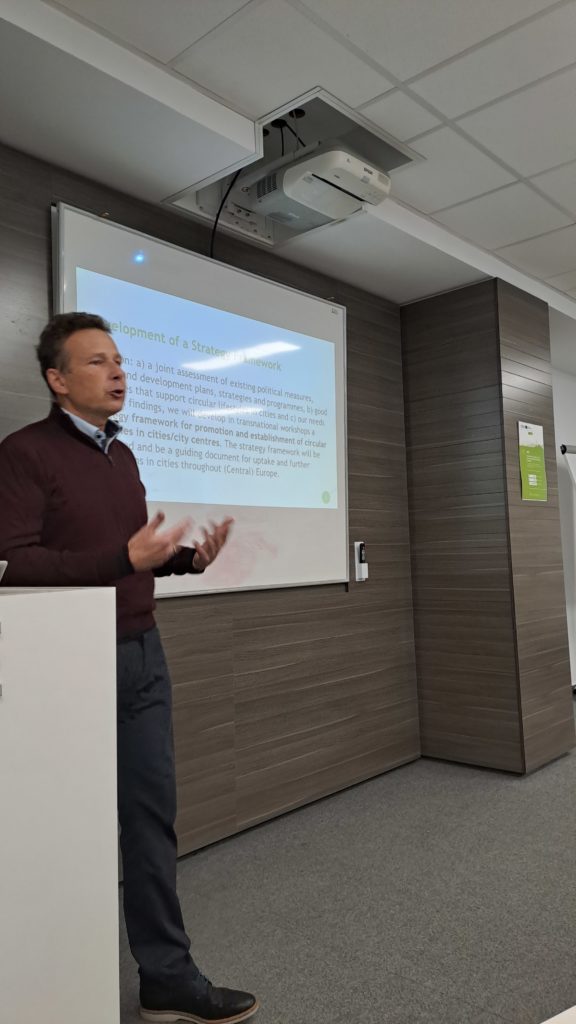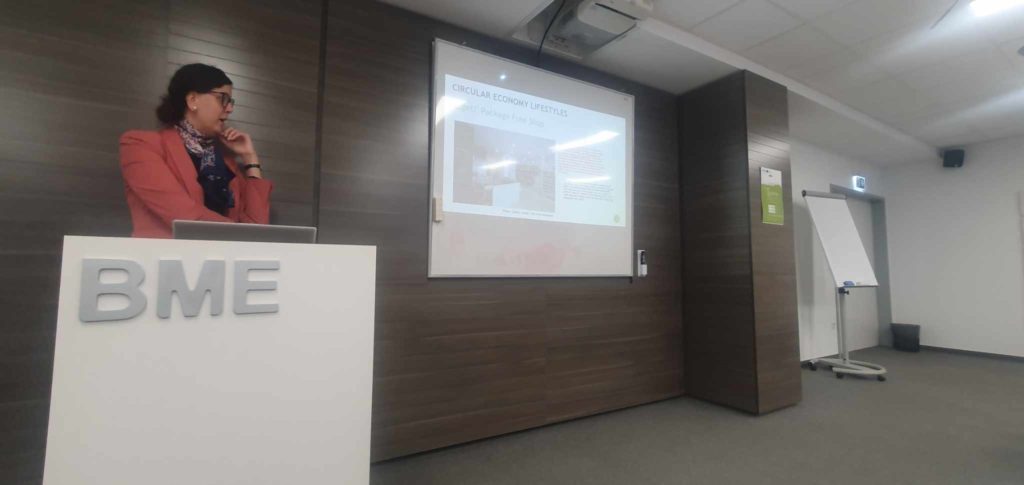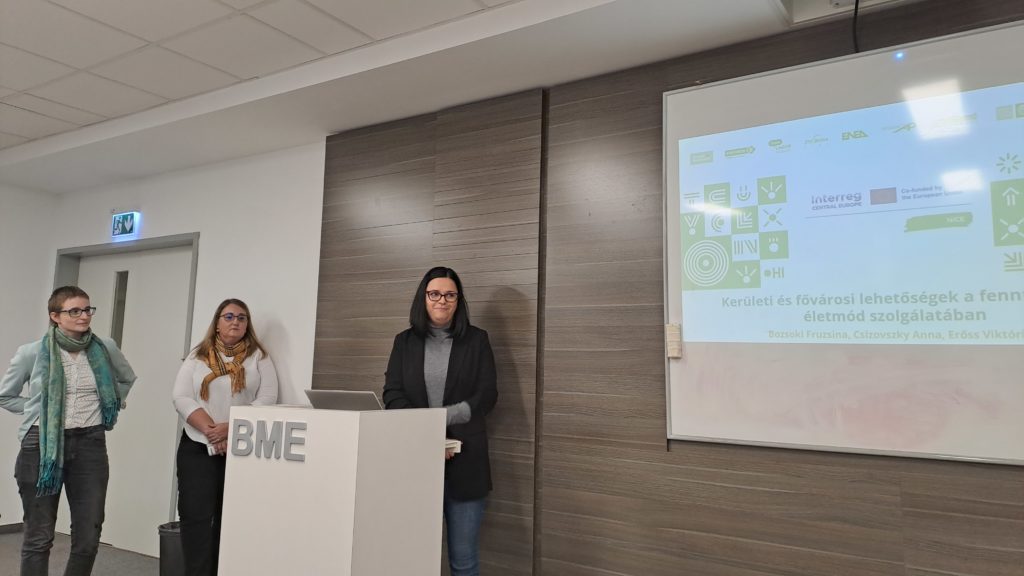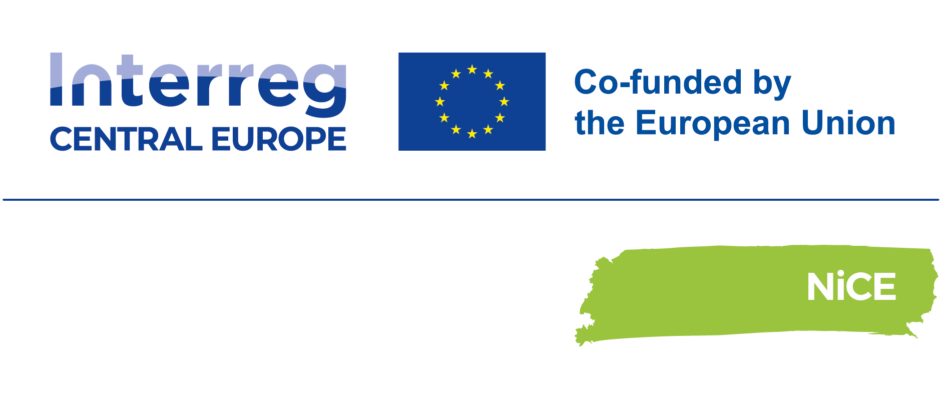“Our (more) sustainable decisions?” – professional forum and workshop within the framework of the Interreg CE “NiCE” project
The forum and workshop of our Department’s “F-Factor – Sustainability Workshop-series”, titled “Our (more) sustainable decisions?” was held on the 26th of October, 2023 amidst keen interest, within the framework of the CE0100312 Interreg Central Europe “NiCE” project.
About the project
The goal of project “NiCE: From Niche to Centre – City Centres as Places of Circular Lifestyles” is the promotion of sustainable consumption patterns related to the circular economy approach within urban spaces and the implementation of specific pilot actions. European city centres used to be busy resource-intensive centres of consumption, but due to the Corona-virus pandemic the trade shifted towards online platforms, numerous shops had to close, and the supply chains were interrupted. Even as the number of alternative and sustainable consumption models leading to more circularity and sufficiency increases, due to the current framework conditions, these models usually only remain in their niche. Consumers therefore lack a central and easily accessible offer of alternative forms of consumption.
The NiCE project focuses on two main challenges – a transformation of central places in cities that make it easy for their inhabitants to implement a sustainable lifestyle and at the same time to (re)animate centres in a more circular way.
9 partners from 8 different countries participate in the NiCE project: The German Environmental Agency (DE) took on the role of consortium-leader; ENVIROS, an environmental protection related consulting company (CZ); StadtLABOR, a lab for sustainable innovation (AT); Scientific Research Centre Bistra Ptuj, a research and development centre (SI); Italian National Agency for New Technologies, Energy and Sustainable Economic Development (IT); Research and Innovation Centre Pro- Akademia (PL); Budapest University of Technology and Economics (HU); Creative Industry Košice, n.o., a creative agency (SK) and the Municipality of Brzeg Dolny (PL).
The main task of the BME Department of Environmental Economics and Sustainability in the project is to provide the scientific and professional background, to lead the 1st (circular economy-centred) workpackage, furthermore, to support the preparation of pilot actions, the monitoring of their implementation, and the development of an indicator-based framework related to performance evaluation.
The three-year project took off in May 2023.
About the “Our (more) sustainable decisions?” – professional forum and workshop (26th of Oktober, 2023)
The BME Department of Environmental Economics and Sustainability started its “F-Factor – Sustainability Workshop-series” discussion forum series in 2011, where theoretical and practical questions related to sustainable development take centre stage. The “Our (more) sustainable decisions?” professional forum and workshop was a new experiment where we invited students to participate not only in the usual lectures, but also in a workshop. Our goal was to gather information related to consumption patterns furthering the realization of, and the business models supporting circular economy, for the synthesis report of the project.
The event was opened by associate professor Dr. Attila Buzási, Head of the Department of Environmental Economics and Sustainability. He highlighted that the workshop aims to actively involve students in order for the resulting solutions of the project implementation to be in line with the needs of the primary, university target group. Professor Dr. Gyula Zilahy, the supervisor of the “NiCE” project explained the main goal and the underlining partnerships of the project as well as the pilot action planned by BME in his presentation. The goal is to develop a new university-level course in the framework of the pilot action, where students can learn to support enterprises, NGO-s or local authorities that prioritize the implementation of a circular economy. Dr. Mariann Szabó, senior lecturer and Deputy Head of Department, Department-supervisor of the “NiCE” project showcased domestic and international good practices, which were recommended for the common, circular-lifestyle related good practice collection by Team BME. In the final presentation PhD students Fruzsina Bozsoki, Anna Csizovszky and Viktória Erőss illustrated their findings in their presentation titled “District and capital level opportunities in service of a sustainable lifestyle”.
 |
 |
 |
After the one-hour period of thought-provoking and introductory lectures, the workshop continued in smaller groups. Due to the keen interest in the workshop, we created three distinct groups, where the work continued with discussions. How much do University citizens know of and use the opportunities supporting a sustainable lifestyle provided by the district and the capital? What encouraging and discouraging factors are there? What solutions are the students most happy about? How can education help to shape the behaviour of students?
After the group discussion we closed the workshop with a forum. At the end of the talks a consensus was reached, stating that the University and its vicinity, the 11th District can be considered one of the better locations in relation to available services. However, these opportunities could and should be propagated on both the University and the district level, which could be achieved with proper communication. Students are looking for help and guidance in defining priorities related to a sustainable lifestyle, for example, reducing energy consumption, choosing environmentally friendly travel methods, reviewing eating habits, and choosing clothing and durable goods can be a good starting point. There are many solutions available, some coupled with apps, which seemingly support circular economy related approaches, but in reality, only stimulate further consumption. The workshop had a pleasant, open, and honest atmosphere, and the participants all agreed that reviewing our consumption patterns and the reduction of consumption are of particular importance in the transition towards sustainability.
